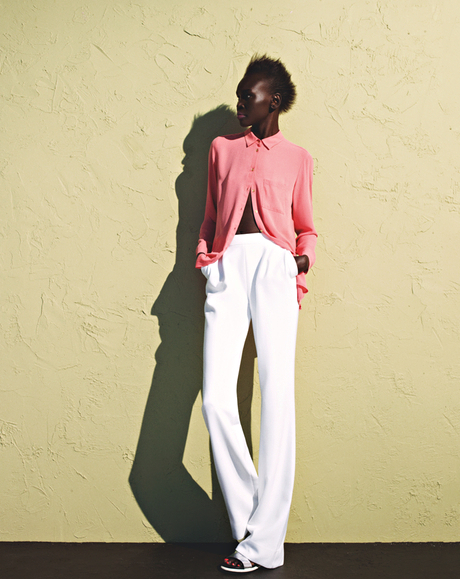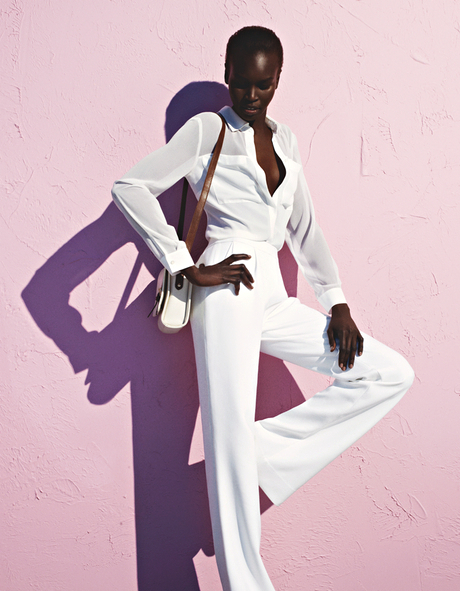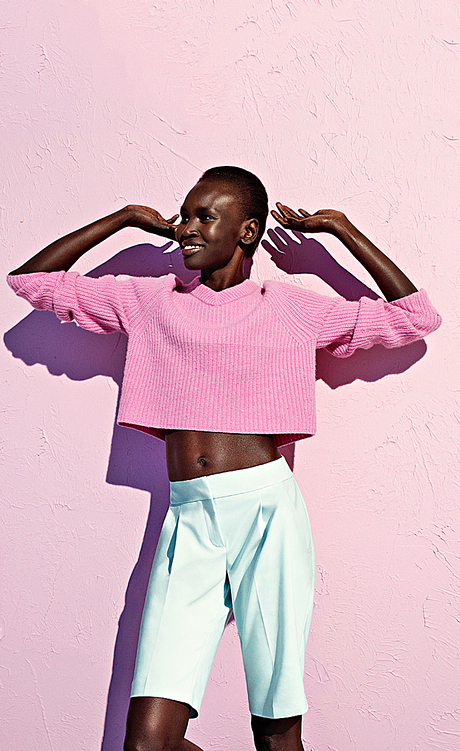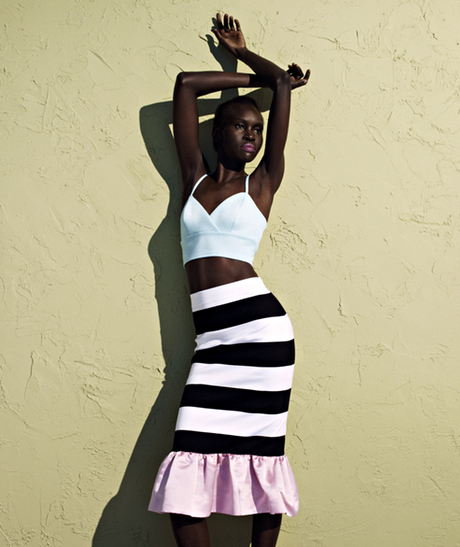She went to New York and had been there barely a week when Ralph Lauren booked her to open and close his catwalk show (the spot normally reserved for the big model of the moment, not a newbie). Calvin Klein, Isaac Mizrahi, Todd Oldham and Anna Sui followed suit. Wek was booked to star in Tina Turner's GoldenEye video, named Model of the Year by i-D magazine and, in 1997 (less than a year after starting out), became the first African model to appear on the cover of Elle magazine.
Wek was born in South Sudan, arriving in London when she was 14, and was acutely aware of how different she was from the other big models of the day, women such as Kate Moss, Claudia Schiffer and Eva Herzigova; while growing up, she had no knowledge of trailblazers such as Iman and Grace Jones. "There was no concept of fashion and catwalk shows where I came from," Wek says. "There were no magazines. I never saw women in makeup, or with different hairstyles. Absolutely not." Now, she says, there are so many South Sudanese girls working as models it is not a big deal; in the late 1990s, she was one of very few successful African models.
"There were black models, but no one as dark-skinned, and none with Dinka features, that's for sure." Even so, she was regularly mistaken for Naomi Campbell, an entirely different-looking model from Streatham with a Jamaican-born mother. She laughs at the ridiculousness: "A black woman is not 'a type'. I never had any interest in those jobs that asked for only black girls. What the hell is that? Would you be comfortable saying you wanted only white girls, or Latin? Are you kidding me? It's baffling."
 Shirt, £35, Limited Edition by Marks & Spencer, marksandspencer.com. Trousers, from a selection, dvf.com. Shoes, £225, whistles.co.uk. Photograph: Gustavo Papaleo for the Guardian. Styling: Priscilla Kwateng.
Shirt, £35, Limited Edition by Marks & Spencer, marksandspencer.com. Trousers, from a selection, dvf.com. Shoes, £225, whistles.co.uk. Photograph: Gustavo Papaleo for the Guardian. Styling: Priscilla Kwateng. At a time when black models were considered commercially more viable if their hair was relaxed, their complexions light, Wek (very dark skin, cropped natural hair) was confident of her value. I have interviewed many models and, without fail, when asked if they always knew they were beautiful, each of them has given me a look of mock horror before going on to list their unsightly features as a child: big feet, too tall, gawky features. But when I ask Wek, she immediately replies, "Oh yes, of course."
There's an argument that this self-belief comes from growing up with what was effectively a media blackout. "Our confidence came from my mother," she says (Alek, pronounced a-LEK, is one of nine children). "She told us it was about celebrating the beauty of being a woman – that's what made you gorgeous." Models hear more direct criticism of their appearance than anyone else, with casting agents, editors and photographers picking apart their features in front of them. "You can feel very strongly that someone doesn't like you. I think any model who didn't have the same sort of upbringing as me would find that very difficult. But I absolutely knew I was entitled. I never thought I was ugly – it never crossed my mind."
From the start, it was high fashion and couture, not mainstream fashion, that most enthusiastically embraced Wek's look. "High fashion were the brave ones," she says. "When I started, I'd hear other people saying, 'God, she's so bizarre-looking', because I didn't look like the girl next door. But I was just normal. I was the girl next door. There were people in high fashion I could better relate to, who were doing something more interesting and not talking this sort of rubbish."
Her early childhood was a happy, peaceful one. "We had an extremely simple life. No running water, no electricity. We walked to a well for drinking water, and the loo was a hole in the ground. My mother ran the house, but if we complained about anything, we'd be told to clean it," she laughs. "It was a tiny town, where everyone knew everyone. We had no idea how poor we were, because we were so rich in our culture, our education. I loved going to school, walking home via the mango trees for a snack."
 Blouse, £29.50, marksandspencer.com. Trousers, from a selection, dvf.com. Bag, £29.50, marksandspencer.com. Photograph: Gustavo Papaleo for the Guardian. Styling: Priscilla Kwateng.
Blouse, £29.50, marksandspencer.com. Trousers, from a selection, dvf.com. Bag, £29.50, marksandspencer.com. Photograph: Gustavo Papaleo for the Guardian. Styling: Priscilla Kwateng. When she was five, civil war broke out. At first her parents kept it from her. "They tried to protect us, but things escalated to such a degree that the militia began fighting the police. Suddenly, neighbours were disappearing mysteriously. You'd go to fetch water and see dead bodies along the way. We all had curfews, we were given regular siren warnings. The police had no resources or ammunition left and, finally, told us to evacuate. There was no accountability. It was chaotic and terrifying."
The Wek family, along with thousands of others from their Dinka tribe, began a long walk deep into the bush to seek safety. Her father, who was unwell and barely able to walk, was carried part of the way. It was rainy season and a bridge across a nearby river was under water, so they travelled on makeshift boats, each family member carrying one item from home: a water bottle, a saucepan, some sheets. Wek was (and still is) unable to swim, and was terrified. "It was horrible," she remembers. "We were squatting in huts that others had evacuated, just to avoid harm from snakes." Her parents, the first generation in their family to have gone to school, were able to identify wild foods that were poisonous and the few that were safe to eat.
The Weks were eventually able to leave for Khartoum because her mother had managed to take a quantity of salt with her, which she sold to people in the bush. Bit by bit, the salt money went on getting passports for the family. Her mother also borrowed tiny plots of land and grew peanuts, roasting and grinding them herself to make enough money to pay for their escape. Every day, the sound of an unscheduled Hercules aid flight would prompt Alek and other local children to run to their temporary homes, hurriedly pack their belongings, then go to the plane to beg the armed officials for a seat. Her critically ill father went first, in the hope of getting medical treatment in Khartoum. Alek made it to the capital a couple of months later, after conspiring with her mother to pose as an uncle's child (the Wek family was too large to escape en masse). She was 12. Her mother arrived three months later. Her father suffered a stroke and serious infection, and died before he could make it out of Sudan.
Wek arrived in London two years later, to live with her sisters in Hackney (her mother followed when she was 16). She attended the former Hackney Free & Parochial CofE secondary school, though she spoke only Arabic and Dinka; she had never known such cold weather. It must have been a disorienting time. "It was really, really hard. Children at that age can be such bullies, period. That's before you even factor in that I looked and sounded so different. But after going through everything, where nothing was ever sure, where I might get killed, I was free and so happy to be learning. I focused on that and threw myself into it." She was assigned her own special needs teacher and was soon fluent in English.
 Jumper, £325, whistles.co.uk. Shorts, £32.50, marksandspencer.com. Photograph: Gustavo Papaleo for the Guardian. Styling: Priscilla Kwateng.
Jumper, £325, whistles.co.uk. Shorts, £32.50, marksandspencer.com. Photograph: Gustavo Papaleo for the Guardian. Styling: Priscilla Kwateng. In 2007 Wek published a book about her journey from refugee to supermodel, and was amazed to find that "people were still not accepting of a model talking about that stuff. We have such a strong voice in fashion, such a platform. We have to utilise that." She says she decided as soon as she started working that she would use her success to talk about South Sudan and its refugee crisis. "We survived by relying on one another. There would be no Alek without that, so it was my responsibility to support them, too." She has worked for several years as an ambassador for the United Nation's refugee agency, the UNHCR, and regularly visits South Sudan's camps.
Did she think the modelling itself was also a way of doing something important? "Yes, absolutely. But it wasn't even about black or white, it was about women. I felt that girls growing up needed to see somebody different, who may have been criticised for their nose, or their hair, or anything – that they could be beautiful. It's about telling girls from a young age that it's OK to be quirky, it's fine to be shy. You don't have to go with the crowd."
One girl inspired by her example was Lupita Nyong'o: the actor paid tribute to Wek as an inspiration soon after winning her Oscar for 12 Years A Slave, saying: "A celebrated model, she was dark as night, she was on all of the runways and in every magazine and everyone was talking about how beautiful she was… My complexion had always been an obstacle to overcome… when I saw Alek, I inadvertently saw a reflection of myself. Now, I had a spring in my step because I felt more seen, more appreciated." Wek says she was extremely touched by this.
"It was very humbling. I never fully understood the magnitude of what I was doing, because I hadn't grown up in this culture." Modelling was, as she puts it, never a case of, "I wanna talk about my handbag and how gorgeous I am!" She has always taken it seriously. "It's work to make it glamorous and it's work to use it for good. There are mothers who sew for six months to make a fashion collection – someone's grandmother, someone's sister. We come in and get paid to walk for 10 minutes at the end. Whenever I think about that, I realise it's not about me. I was just the one chosen to represent those women and sell the clothes."
Wek is now able to choose her assignments (between studying design, working on a handbag collection, and writing), but still loves the business. "The day you stop enjoying something is the day you should quit, if you can afford to," she says. "I can no longer face doing 10 fashion shows a day. But we travel constantly and see places people only dream of. We can eat wherever we want and always know there's drinking water – my mother had to boil water to stop me getting sick. I never take that for granted."

She is based in Brooklyn, New York, and lives very comfortably, having made many smart investments and career decisions. She has recently split from her long-term partner and is navigating the dating scene, weeding out those who clearly "just want to date a model", but also deftly sidestepping her mother's requests that she find a man in South Sudan. "I want to have babies in the next five years," she says matter-of-factly, without being asked.
She has recently been signed up by Marks & Spencer for a campaign alongside Emma Thompson, Annie Lennox and Rita Ora. "It's a huge deal for me, because M&S is a legend. I remember arriving in London and going there for my tights and scarves, it was so cold!" Her adoption by a very British institution seems fitting. "This is a place that's very close to my heart, and a big part of who I am. It was the most exciting thing to leave secondary school and go to college, to have that freedom to study whatever I wanted. I could never understand why other kids wanted to truant – my education here gave me everything. It's the place where I really got to flourish."
Alek Wek is represented by Storm Model Management.
The Guardian


Black is beautiful
ReplyDeleteAfrican beauty.
ReplyDeleteAfrican beauty, authentically African.
ReplyDeleteTrue symbol of Africa
ReplyDeleteVery beautiful
ReplyDelete